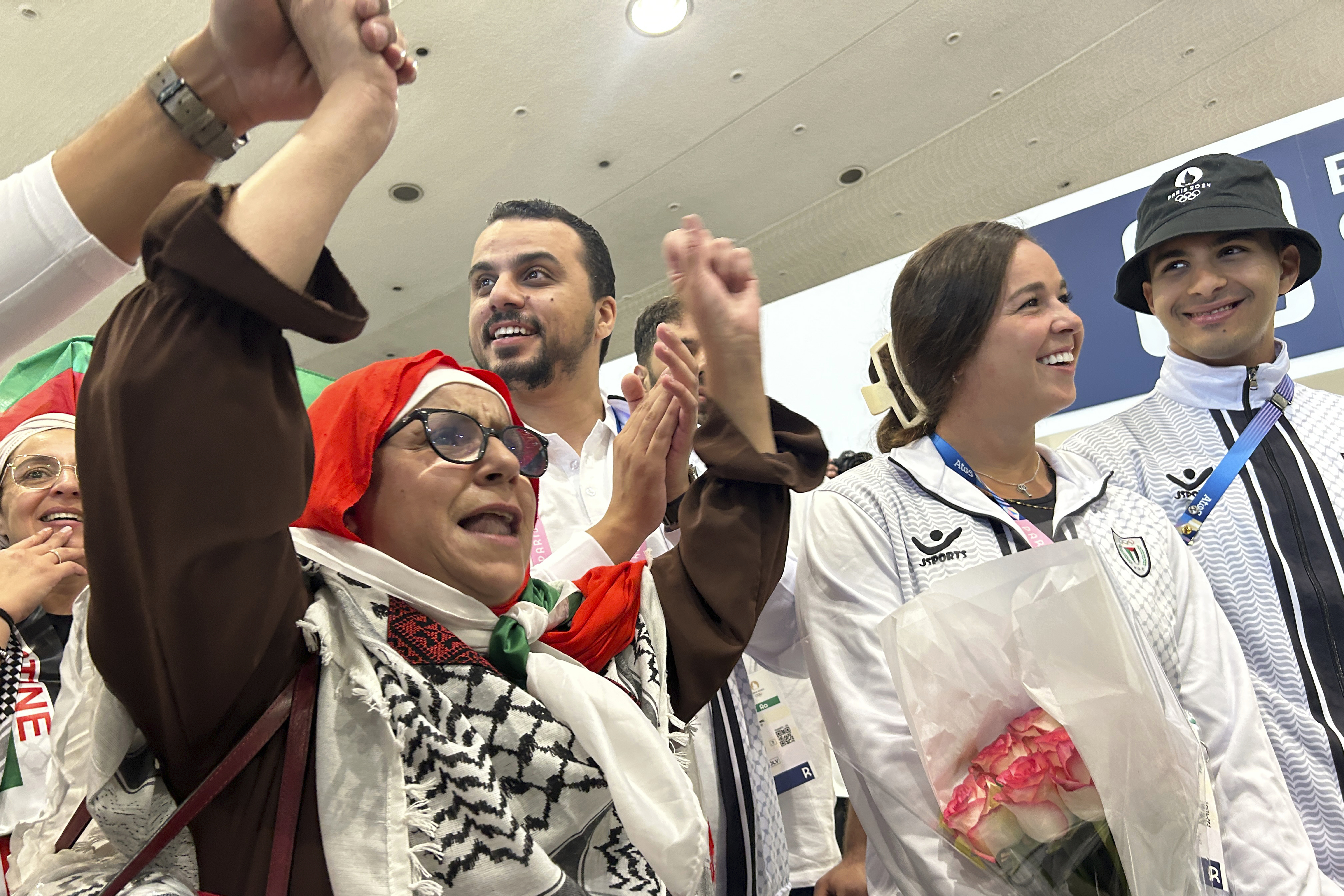
Supporters and fans cheer for Palestinian athletes like Valerie Tarazi, second right, at the Paris Charles de Gaulle airport, at the Paris Olympics 2024, Thursday, July 25, 2024, in Roissy, north of Paris, France. (AP Photo/Megan Janetsky)
PARIS — Palestinian Olympic athletes were greeted with a roar of a crowd and gifts of food and roses as they arrived in Paris on Thursday, ready to represent war–torn Gaza and the rest of the territories on a global stage.
As the beaming athletes walked through a sea of Palestinian flags at the main Paris airport, they said they hoped their presence would serve as a symbol amid the Israel-Hamas war that has claimed more than 39,000 Palestinian lives.
Athletes, French supporters and politicians in the crowd urged the European nation to recognize a Palestinian state, while others expressed outrage at Israel’s presence at the Games after U.N.-backed human rights experts said Israeli authorities were responsible for “war crimes and crimes against humanity.”
The same report said Palestinian militants committed war crimes during the first months of the war in Gaza, which began after Hamas launched deadly attacks on Israel on Oct. 7. Israel has rejected the allegations from the independent experts.
“France doesn’t recognize Palestine as a country, so I am here to raise the flag,” said Yazan Al-Bawwab, a 24-year-old Palestinian swimmer born in Saudi Arabia. “We’re not treated like human beings, so when we come play sports, people realize we are equal to them.”
“We’re 50 million people without a country,” he added.
Al-Bawwab, one of eight athletes on the Palestinian team, signed autographs for supporters and plucked dates from a plate offered by a child in the crowd.
The chants of “free Palestine” echoing through the Paris Charles de Gaulle airport show how conflict and the political tension are rippling through the Olympic Games. The world is coming together in Paris at a moment of global political upheaval, multiple wars, historic migration and a deepening climate crisis, all issues that have risen to the forefront of conversation in the Olympics.
In May, French President Emmanuel Macron said he prepared to officially recognize a Palestinian state but that the step should “come at a useful moment” when emotions aren’t running as high. That fueled anger by some like 34-year-old Paris resident Ibrahim Bechrori, who was among dozens of supporters waiting to greet the Palestinian athletes in the airport.
“I’m here to show them they’re not alone, they’re supported,” Bechrouri said. Them being here “shows that the Palestinian people will continue to exist, that they won’t be erased. It also means that despite the dire situation, they’re staying resilient. They’re still a part of the world and are here to stay.”
Palestinian ambassador to France Hala Abou called for France to formally recognize a Palestinian state and for a boycott of the Israeli Olympic delegation. Abou has previously said she has lost 60 relatives in the war.
“It’s welcome that comes as no surprise to the French people, who support justice, support the Palestinian people, support their inalienable right to self-determination,” she said.
That call for recognition comes just a day after Israel’s Prime Minister Benjamin Netanyahu delivered a scathing speech to Congress during a visit to Washington, which was met with protests. He declared he would achieve “total victory” against Hamas and called those protesting the war on college campuses and elsewhere in the U.S. “useful idiots” for Iran.
Israel’s embassy in Paris echoed the International Olympic Committee in a “decision to separate politics from the Games.”
“We welcome the Olympic Games and our wonderful delegation to France. We also welcome the participation of all the foreign delegations,” the Embassy wrote in a statement to The Associated Press. “Our athletes are here to proudly represent their country, and the entire nation is behind to support them.”
The AP has made multiple attempts to speak with Israeli athletes without success.
Even under the best of circumstances, it is difficult to maintain a vibrant Olympics training program in Gaza, the West Bank and east Jerusalem. That’s become next to impossible in nine months of war between Israel and Hamas as much of the country’s sporting infrastructure have been devastated.
Among the large Palestinian diaspora worldwide, many of the athletes on the team were born or live elsewhere, yet they care deeply about the politics of their parents’ and grandparents’ homeland. Among them was Palestinian American swimmer Valerie Tarazi, who handed out traditional keffiyehs to supporters surrounding her Thursday.
“You can either crumble under pressure or use it as energy,” she said. “I chose to use it as energy.”